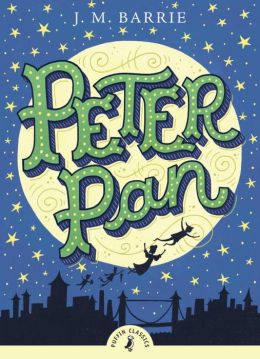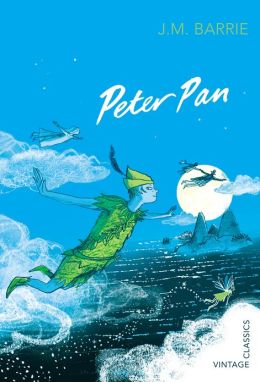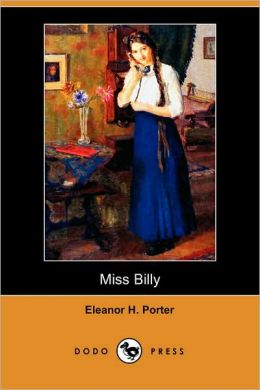Peter Pan. J.M. Barrie. 1911/2008. Penguin. 207 pages. [Source: Review copy]
All children except one, grow up. They soon know that they will grow up, and the way Wendy knew was this. One day when she was two years old she was playing in a garden, and she plucked another flower and ran with it to her mother. I suppose she must have looked rather delightful, for Mrs. Darling put her hand to her heart and cried, 'Oh, why can't you remain like this for ever!' This was all that passed between them on the subject, but henceforth Wendy knew that she must grow up. You always know after you are two. Two is the beginning of the end.
Peter Pan may be far from perfect when all things are considered, but, it certainly can prove a delightful reread now and then. Though I haven't seen the musical in years, I first became familiar with this story through the musical: the dialogue and the songs. So when I first read it fifteen years ago (or so), it felt familiar from the start. Tinker Bell was fierce, a very jealous and very stubborn fairy. Peter Pan was oh-so-arrogant and a bit obnoxious, quite thoughtless. Wendy and her brothers, well, I had to admit they were a bit thoughtless as well. But there was something touching about Wendy. And then there are all the other inhabitants of Never Never Land: the Lost Boys, the Indians, and the pirates led by Captain Hook, to name just a few.
The book is dated, very dated, and to modern readers it may not hold up well. The place is sculpted, in a way, by the dreams and fantasies of children. Wendy and her two brothers, for example, imagine a lot of things: playing Indians, playing pirates, visiting with mermaids, playing with wolves, etc. It is an island, a land, like no other. All fancy--make believe, if you will. I find it delightful, very delightful at times. It is not my favorite, favorite children's book by ANY stretch of the imagination. But I think it's a fun one to know.
Quotes:
Mrs. Darling loved to have everything just so, and Mr. Darling had a passion for being exactly like his neighbors; so, of course, they had a nurse. As they were poor, owing to the amount of milk the children drank, this nurse was a prim Newfoundland dog, called Nana, who had belonged to no one in particular until the Darlings engaged her. (4)
Mrs. Darling first heard of Pepter when she was tidying up her children's minds. It is the nightly custom of every good mother after her children are asleep to rummage in their minds and put things straight for next morning, repacking into their proper places the many articles that have wandered during the day. (6)
Of all delectable islands the Neverland is the snuggest and most compact; not large and sprawly, you know, with tedious distances between one adventure and another, but nicely crammed. When you play at it by day with the chairs and table-cloth, it is not in the least alarming but in the two minutes before you go to sleep it becomes very nearly real. That is why there are night lights. (8)
"Why, what is the matter, father, dear?"
"Matter!" he yelled; he really yelled. "This tie, it will not tie." He became dangerously sarcastic. "Not round my neck! Round the bedpost! Oh yes, twenty times have I made it up round the bedpost, but round my neck, no! Oh dear no! begs to be excused!'
He thought Mrs. Darling was not sufficiently impressed, and he went on sternly, "I warn you of this, mother, that unless this tie is round my neck we don't go out to dinner tonight, and if I don't go out to dinner tonight, I never go to the office again, and if I don't go to the office again, you and I starve, and our children will be flung into the streets."
Even then Mrs. Darling was placid. (17-8)
"That is not Nana's unhappy bark," she said, little guessing what was about to happen; "that is her bark when she smells danger." (24)
It was a girl called Tinker Bell, exquistely gowned in a skeleton leaf, cut low and square, through which her figure could be seen to the best advantage. She was slightly inclined to embonpoint. (26)
"You see, Wendy, when the first baby laughed for the first time, its laugh broke into a thousand pieces, and they all went skipping about, and that was the beginning of fairies. And so," he went on good naturedly, "there ought to be one fairy for every boy and girl."
"Ought to be? Isn't there?"
"No. You see, children know such a lot now, they soon don't believe in fairies, and every time a child says, "I don't believe in fairies," there is a fairy somewhere that falls down dead." (33)
"Second to the right, and straight on till morning." That, Peter had told Wendy, was the way to the Neverland; but even birds, carrying maps and consulting them at windy corners, could not have sighted it with these instructions. Peter, you see, just said anything that came into his head. (45)
Tink was not all bad: or, rather, she was all bad just now, but, on the other hand, sometimes she was all good. Fairies have to be one thing or the other, because being so small they unfortunately have room for one feeling only at a time. They are, however, allowed to change, only it must be a complete change. At present she was full of jealousy of Wendy. (57)
The lost boys were out looking for Peter, the pirates were out looking for the lost boys, the redskins were out looking for the pirates, and the beasts were out looking for the redskins. They were going round and round the island, but they did not meet because all were going at the same rate. (58)
One could mention many lovable traits in Smee. For instance, after killing, it was his spectacles he wiped instead of his weapon. (67)
"Aye," the captain answered, "If I was a mother I would pray to have my children born with this instead of that," and he cast a look of pride upon his iron hand and one of scorn upon the other. Then again he frowned.
"Peter flung my arm," he said, wincing, "to a crocodile that happened to be passing by."
"I have often," said Smee, "noticed your strange dread of crocodiles."
"Not of crocodiles," Hook corrected him, "but of that one crocodile." He lowered his voice, "It liked my arm so much, Smee, that it has followed me ever since, from sea to sea and from land to land, licking its lips for the rest of me."
"In a way," said Smee, "It's a sort of compliment."
"I want no such compliments," Hook barked petulantly. (68)
There was not a child on board the brig that night who did not already love him. He had said horrid things to them and hit them with the palm of his hand, because he could not hit with his fist; but they had only clung to him the more. Michael had tried on his spectacles. To tell poor Smee that they thought him lovable! Hook itched to do it, but it seemed too brutal. (159)© 2014 Becky Laney of Becky's Book Reviews







My ρаge - payday loan,
Also see my web page - payday loans
Season of love is back. So it is the time of delivering gifts for your sweethearts. Valentine’s Day Gifts can be delivered to the various locations of India with the online shopping site www.indiafloristnetwork.com that covers India in a single network.
Once the clients know the reach of the online gift concern, the duration of the delivery, the items that could be delivered etc. it becomes easy for the client to plan the exact delivery schedule. A click at www.indiafloristnetwork.com/Locations.asp does just that.